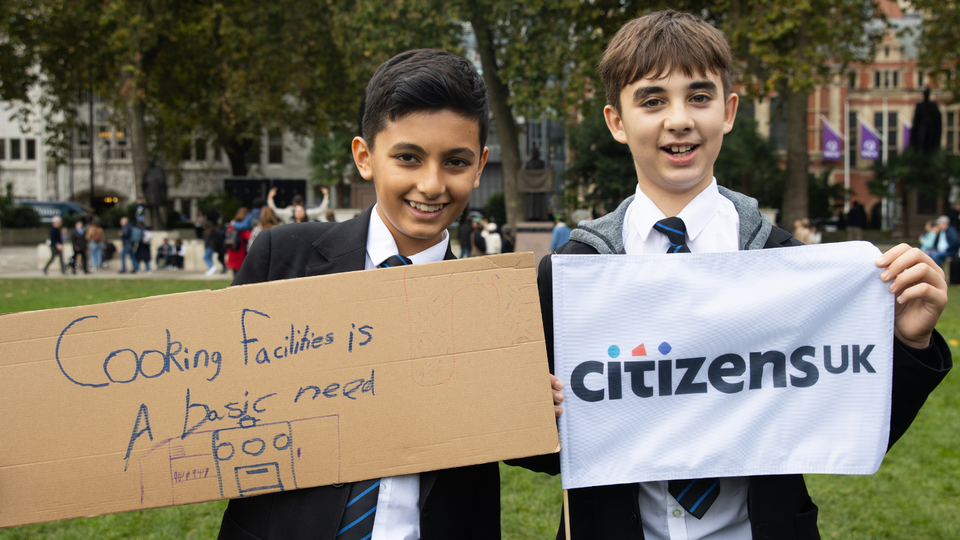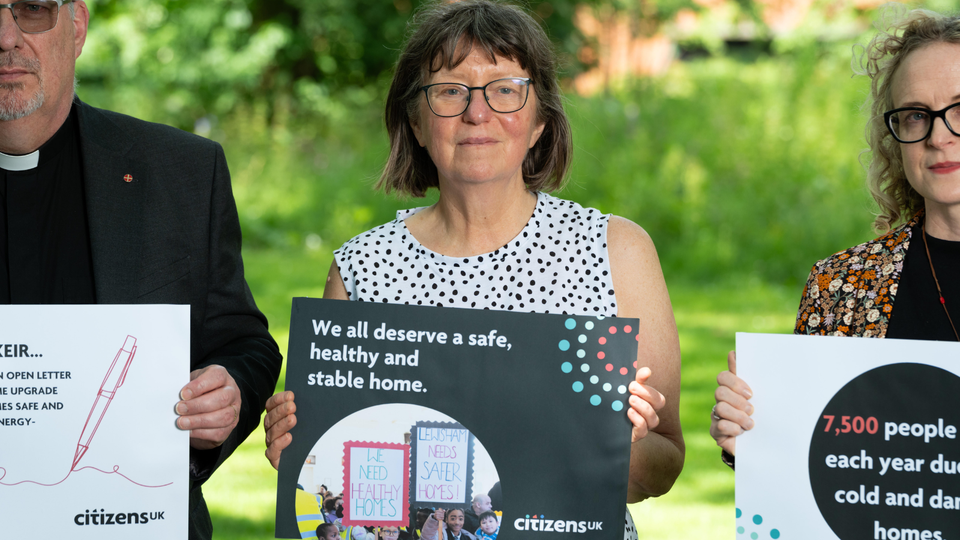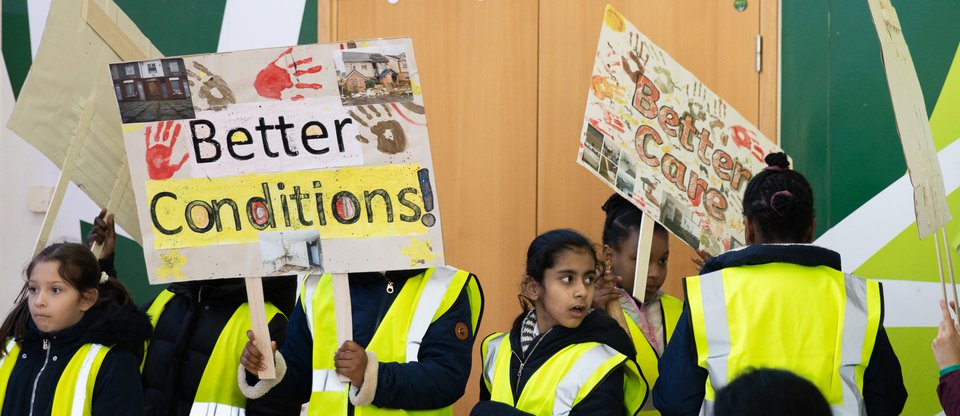New report by Citizens UK and Trust for London reveals the dire state of temporary accommodation in the UK
New report by Citizens UK and Trust for London reveals the dire state of temporary accommodation in the UK

A new report launched by Citizens UK and Trust for London: 'A long way from home: Improving the experiences of people in temporary accommodation' reveals the dire state of temporary accommodation (TA) in the UK, with thousands of families across the UK being trapped in a broken system. Previous independent research commissioned by Citizens UK, from local government expert Jack Shaw presented 164,000 children living in temporary accommodation in England and 56% of this figure are based in London.
This report reveals that the temporary accommodation crisis:
Spans across generations
A median household in temporary accommodation is a parent in their twenties, thirties or forties with one or two children. Behind these medians are young children at one end of the spectrum and elderly people in their 90s at the other.
Some children are spending their whole childhoods in temporary accommodation, such as one family with children in Croydon who have been living in temporary accommodation since 1998 and have spent over 9,500 days in temporary accommodation. At the other end, there are people in their 90s living in temporary accommodation, such as the case of one 97 year old in Brent who’s been in temporary accommodation for three years.

Leaves people struggling to access basic necessities
People living in temporary accommodation are struggling to access basic necessities, such as washing facilities to wash and dry clothes.
In many local authorities, households are able to use washing machines and they are either free of charge or are covered by service charges. In other cases, such as Barking and Dagenham, which leases their washing machines, there is a charge. Newham also leases their washing machines, as does Manchester.
According to polling commissioned by detergent manufacturer Ariel, the average household washes their clothing four times per week, equivalent to 208 washes annually. On that basis, households in temporary accommodation in Newham–where the cost is the highest–could spend up to £900 per year washing and drying their clothing. Professor Monica Lakhanpaul of the Institute of Child Health at University College London told us that she’d interviewed families that were discouraging their children from certain forms of play or messy foods because they couldn’t afford the cost of washing their clothing.
"I lived in temporary accommodation with my son. When he was asking questions about why we were moving again, why we were sharing accommodation with others, why he had no space to play, I kept pretending everything was normal and we would get our place one day and be finally happy.
I kept spending lots of time outside in coffee shops to stay warm and to avoid my son getting dirty playing outside as we had no laundry available."
-Khadija, a mum from South London.
People have also reported on the dire situation for storage of their belongings, with some travelling miles to access items and others accruing debt to maintain the storage. For example, Islington charges households £130 before belongings can be taken into storage and £40 thereafter if households wish to access their belongings. In Enfield, households are subject to a £30 charge each time they access their belongings.

Faces deepening geographical inequalities
Where households are being placed raises questions of equality and equity, and the concentration of placements can add further pressure on local housing markets. More affluent boroughs are increasingly placing homeless families into more deprived areas, isolating families from their communities and placing additional strain on already under-resourced areas.
Bromley, Richmond upon Thames and Merton are among the least disadvantaged but place some of the highest percentages of their residents outside their boundaries at over 75 per cent. Brent and Barking & Dagenham, on the other hand, which are in the top quintile for disadvantage, placed six per cent of their households in temporary accommodation outside their boundaries.

Community leaders across Citizens UK are calling on the government to take immediate action to improve temporary accommodation, including access to five standards that we all expect in our day-to-day lives to ensure people in temporary accommodation can live with dignity: cooking facilities, information, WiFi, laundry and storage.
Recommendations also cover data collection and sharing, including:
- The government to collect and publish more information, including the age of each individual in temporary accommodation and where out-of-area placements are sent by authority. This will better inform local authorities, so will have a complete picture of who is being sent where and encourage more evidence-based action.
- GP surgeries and schools to be alerted by local authorities when their patients and pupils are placed in temporary accommodation, to encourage increased collaboration between local authorities and their support services so people in temporary accommodation are not forgotten.
- The NHS to record when it engages with people in temporary accommodation, to better help practitioners and policy-makers to understand the health implications of people living in temporary accommodation, and to respond to them.
Recommendations in the report also cover public service reform, such as a new nationwide protocol to govern when households are placed in accommodation outside their area, and more accountability measures, such as on local authority performance.
Community leaders urge the government to work in collaboration with local authorities and communities to ensure that the standards are met consistently across the UK.
"Imagine, living in two hotel rooms for 5 months with 4 children aged 11, 8, 7 and 2, a reality for one of the many families living in temp accommodation in Peterborough. The parents and children’s physical and mental health declined; the family were in absolute despair. We helped where we could, did laundry at school, invited the children to holiday and after school clubs, provided transport so they didn’t lose their school as well as their home, these were all just drops in the ocean of their despair. Temporary accommodation shakes the very foundations of what family life should be built on."
Kelly, Community Engagement Lead at Thomas Deacon Academy, Peterborough Citizens.

Temporary accommodation should be a lifeline for those who need it, not a trap. This research sheds light on the harsh realities that people living in temporary accommodation face daily. Families spend years, and even decades, in accommodation that is supposed to act as a springboard into a stable home. For many, basic necessities such as access to cooking facilities, washing and drying clothes, and storing belongings are not being met. No one should have to live this way, and no child should be growing up without the security of a home that meets all of their needs.
We need urgent action to deal with this crisis. The government must step up and set national standards to ensure people can live with dignity across the country.
Emmanuel Gotora, Assistant Director at Citizens UK

We know that everyday people have the ability to shape the world around them by working together. Find out more about our Housing & Homelessness campaign.




